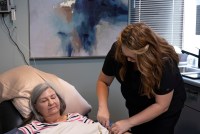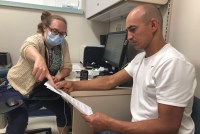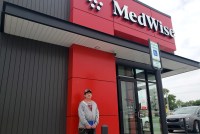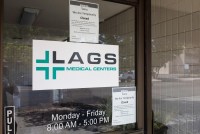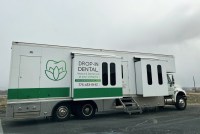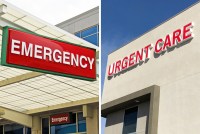Latest KFF Health News Stories
As ICE Moved In, Minnesotans Set Up a Shadow Medical System. It’s a Lesson for Other Cities.
President Donald Trump’s immigration crackdown in Minneapolis forced families into hiding and catalyzed informal medical networks to deliver critical health care services.
California Faces Limits as It Directs Health Facilities To Push Back on Immigration Raids
California now has a law requiring hospitals and clinics to improve patient privacy and have clear protocols for handling requests by immigration agents. Legal experts say the state can’t fully protect immigrant patients, because federal authorities are allowed in public places, including hospital lobbies, general waiting areas, and parking lots.
What the Health? From KFF Health News: The Senate Saves PEPFAR Funding — For Now
The Senate narrowly approved the Trump administration’s request to claw back about $9 billion for foreign aid and public broadcasting but refused to cut funding for the international AIDS/HIV program PEPFAR. Meanwhile, a federal appeals court ruled that West Virginia can ban the abortion pill mifepristone, which could allow states to block other FDA-approved drugs. Joanne Kenen of the Johns Hopkins Bloomberg School of Public Health and Politico Magazine, Shefali Luthra of The 19th, and Sandhya Raman of CQ Roll Call join KFF Health News’ Julie Rovner to discuss these stories and more.
‘A Pressure Campaign’: Beverly Hills Settles After Allegedly Blocking Abortion Clinic
California Attorney General Rob Bonta announced a settlement with Beverly Hills after finding city officials pressured the landlord to cancel DuPont Clinic’s lease. It’s the state’s first enforcement action under Proposition 1, which enshrined abortion rights in the state constitution.
Abortion Clinics — And Patients — Are on the Move as State Laws Shift
Last month, Planned Parenthood Great Plains opened its newest clinic in Pittsburg, Kan., a city of about 21,000 people mere minutes from the borders of both Missouri and Oklahoma. It’s the second new clinic the regional affiliate has opened in Kansas in a little over two years, to accommodate the growing number of patients coming […]
Safety-Net Health Clinics Cut Services and Staff Amid Medicaid ‘Unwinding’
One of Montana’s largest safety-net health centers announced it will lay off nearly 10% of its workforce because of revenue losses it attributes to vast Medicaid disenrollments. Such cuts are happening elsewhere too.
Ketamine Therapy for Mental Health a ‘Wild West’ for Doctors and Patients
Ketamine, approved by the FDA as an anesthetic in 1970, is emerging as a major alternative mental health treatment, and there are now more than 500 ketamine clinics around the country. But with little regulation and widely varying treatment protocols, it’s a medical “wild West.”
Rising Malpractice Premiums Price Small Clinics Out of Gender-Affirming Care for Minors
Even in states where laws protect minors’ access to gender-affirming care, malpractice insurance premiums are keeping small and independent clinics from treating patients.
What Mobile Clinics in Dollar General Parking Lots Say About Health Care in Rural America
Dollar General’s pilot mobile clinic program has been touted by company officials, rural health experts, and analysts as a model that could help solve rural America’s primary care shortage. But its Tennessee launch has been met with local skepticism.
When Temps Rise, So Do Medical Risks. Should Doctors and Nurses Talk More About Heat?
The medical dangers of heat are real. But people often ignore public heat alerts or don’t realize how vulnerable they are. A new alert system prompts clinicians to talk about heat with patients.
Funyuns and Flu Shots? Gas Station Company Ventures Into Urgent Care
A Tulsa-based gas station chain is using its knowledge of how to serve customers and locate shops in easy-to-find spots to enter the urgent care industry, which has doubled in size over the past decade. Experts question how the explosion of convenient clinics will affect care costs and wait times.
New Alzheimer’s Drug Raises Hopes — Along With Questions
Clinics serving Alzheimer’s patients are working out the details of who will get treated with the new drug Leqembi. It won’t be for everyone with memory-loss symptoms.
Pain Clinic Chain to Pay $11.4M to Settle Medicare and Medicaid Fraud Claims
The owner of one of California’s largest chains of pain management clinics has agreed to pay California, Oregon, and the federal government to settle Medicare and Medi-Cal fraud allegations.
Montana Clinics Chip Away at Refugees’ Obstacles to Dental Care
As the number of refugees entering the U.S. grows, those arriving in Montana and other rural areas find limited dental care options.
A Catch-22 for Clinics: State Bans Limit Abortion Counseling. Federal Title X Rules Require It.
Family planning clinics are getting caught between state abortion bans and a federal requirement to refer patients for abortion care on request.
Mobile Clinics Really Got Rolling in the Pandemic. A New Law Will Help Them Cast a Wider Safety Net.
Mobile clinics that provided covid-19 testing and vaccines at the peak of the pandemic are now being used to provide a range of health services in hard-to-reach communities. A law passed late last year allows qualified health care centers to use federal grants to expand the fleets.
Una sorprendente decisión judicial emitida en diciembre, un juez federal dictaminó que estas clínicas violan la ley estatal de Texas y los derechos constitucionales federales, cortando de raíz una fuente vital de atención médica para mujeres jóvenes en el estado.
Girls in Texas Could Get Birth Control at Federal Clinics, Until a Christian Father Objected
A Donald Trump-appointed federal judge agreed that even the possibility that the father’s daughters might access contraception without his permission violated the tenants of his Christian faith.
California’s Massive Medicaid Program Works for Some, but Fails Many Others
Medi-Cal serves more than one-third of the state’s population — offering a dizzying range of care to a diverse population. In the new “Faces of Medi-Cal” series, California Healthline will assess the program’s strengths and weaknesses through the lives and experiences of its enrollees.
¿Clínica de urgencias o sala de emergencias? Cómo decidir donde recibir la atención adecuada
Las personas heridas o enfermas deben decidir con cuidado, en un momento de estrés, cuál es el mejor lugar para buscar ayuda. Y deben tomar esa decisión en medio de un número creciente de opciones.









